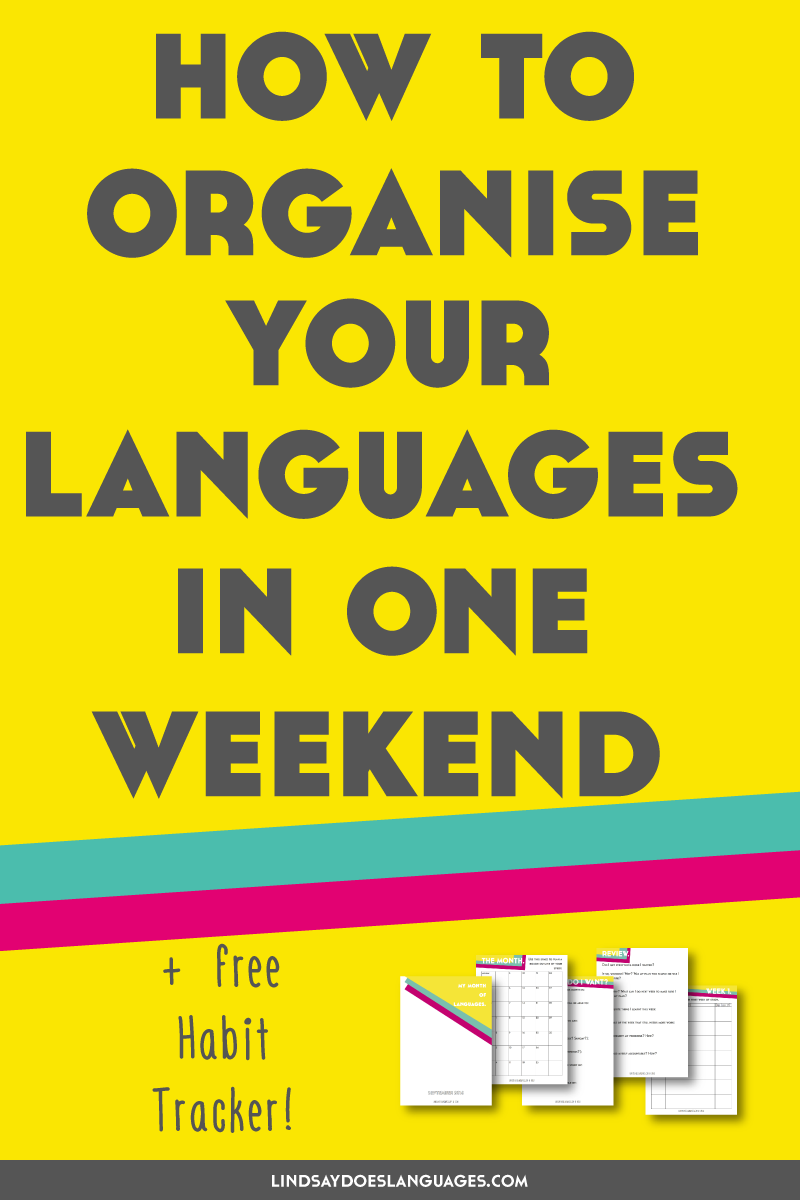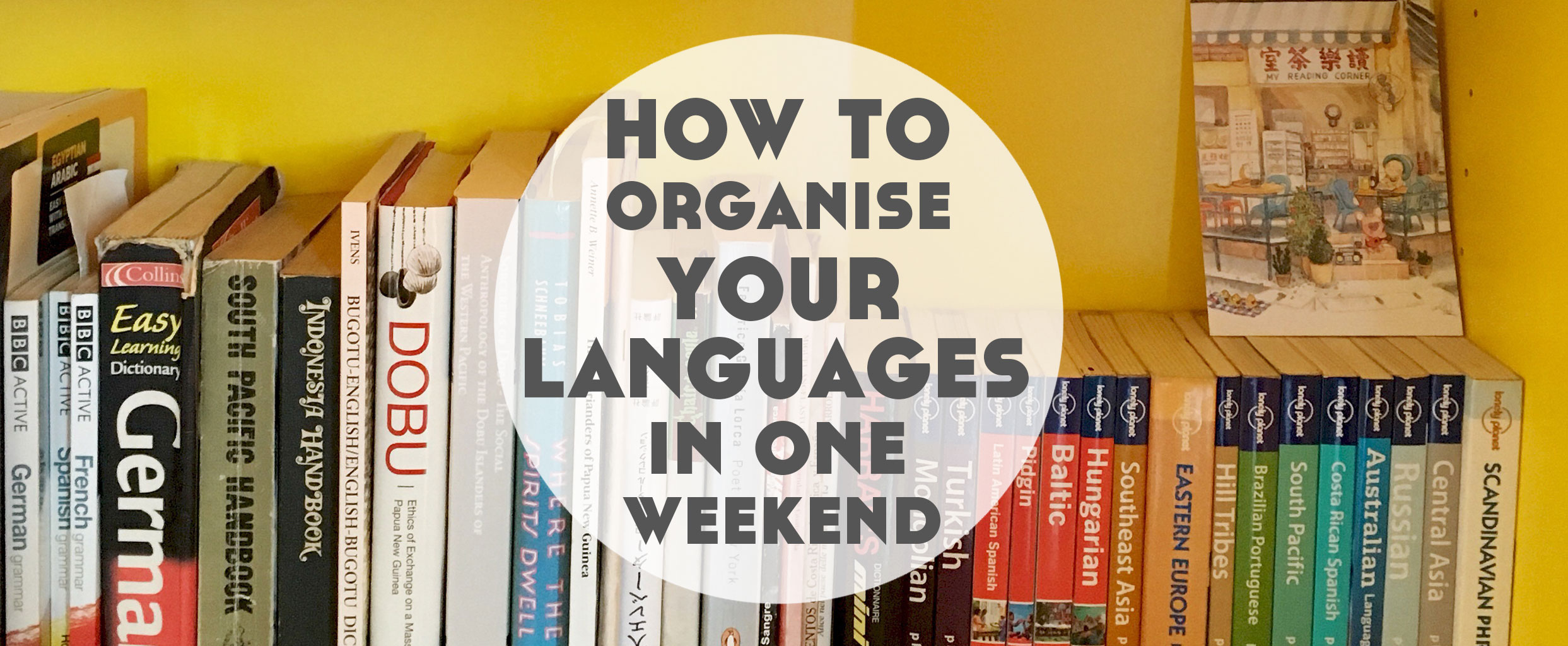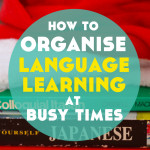March 12th, 2021
How to Organise Your Language Learning in One Weekend
You know when it feels like you’re losing control of your language learning? Like you’re not actually sure if you’re doing the right thing, if you’re making progress, if you’re even good at this thing?! Yeah. Here’s how to take control of your language learning in one weekend.

Sometimes one of the best things we can do is to hit pause, take a breath and start again. Think of this weekend as your Language Spa Break.
You won’t actually be learning languages, but by the end of it, you’ll be feeling refreshed, revitalised, and ready to go!
Get your free language habit tracker.
Organise, prioritise and feel on top of your language learning with my free Language Habit Tracker.
The tracker lets you add and edit your own favourite things that you want to track. It’s super flexible and can be used again and again.
Get your free tracker when you join my email list below.
Friday Night
Personally, I like to think that the weekend starts Thursday night. At least when it’s Riverdale season time. But I’ll stick to what many of us think of as “weekend” here. So we’ll go from Friday night through Saturday to Sunday.
Of course, these could be any days you like! Holy day for you on Friday, Saturday or Sunday? Working weekends? No worries. Feel free to switch the days you do this.
There’s not much to do on the eve of your Take Language Control Weekend (we’ll call it TLC Weekend from here. Everyone loves an acronym. Any it kinda fits with the whole “Language Spa” thing we’ve got going on.)
But we still need to acknowledge something here: Over the next two days, you are not going to do any language learning.
That’s it.
Sounds small, right? Well, yes. But it might be difficult, especially of those of us most in need of a TLC Weekend.
Your task for Friday night is simple: Accept that. Accept that these two days will be about hitting pause, taking a good long hard look at things, and hitting reset again so you’re ready to go, fully recharged!
Saturday
Ok, roll up your sleeves.
Saturday is where most of the hard work is going to take place. Think of this as the day pumping hard at the gym and getting those uncomfortable deep tissue massages before tomorrow’s lounge around the jacuzzis and facial.
There’s a few things on our agenda. So let’s get to it!
Gather Everything
First things first, find everything you have to do with that language. Books, notebooks, DVDs, PDF fils, apps, podcasts. Even travel guides, recipe books. Really dig deep and get everything out in front of you.
You can make a list of the digital stuff if that helps to better visualise it. Even better, use Post Its or squares of paper to spread out in front alongside everything else. This will help to show you much clearer everything you have “on board”.
It’s incredible how much we accumulate, no?
Physical Tidy
You can do this however best works for you.
Marie Kondo style, picking up each item and asking if it “sparks joy”. Or putting everything into one big bin bag and working backwards, remembering what you want to keep and taking things back out one at a time. Your call.
However you choose, it’s helpful to do an initial sweep of stuff. Think of this as that first exfoliation. We’ve still got to scrub between the toes, but that comes later. Now let’s shed the bigger stuff.
If you have any language friends nearby, it could be a great chance to donate or swap with them. That way you know things are going to a good place. Alternatively, you can donate to charity and second hand shops.
Digital Tidy
Clutter in this day and age isn’t always visible. In fact, sometimes digital clutter can feel more overwhelming then physical stuff.
The next step is to do a digital declutter.
Once again, start big. Let’s look at the stuff we can see that’s not used or useful. Delete any apps or computer programs for language learning that you don’t use or don’t find useful.
Next, head into your podcasts, your Spotify playlists, your Netflix language profile list, your Memrise/Anki/Quizlet/Duolingo courses you’ve signed up for. Anything there no longer ticking all the boxes? Erase! Delete! Remove from list!
Now it’s time to check the files, the harddrives, and…the downloads folder! It’s way too easy to download stuff, leave it sitting in the download folder with good intentions and never actually get around to using it.
A simple rule of thumb here? If it’s been there longer than 3 months and not been used, delete no questions asked. And if it’s been there less than 3 months and you do plan to use it, organise it somewhere you’ll actually see it and use it.
Finally, email. Open your inbox and save just one email each from all the language places and people you’ve signed up to but never engage with.
Open them one by one. Interested? Archive that email and stay on their email list.
Not interested? There’ll be an option to unsubscribe at the bottom of each email. (If there’s not, try replying and requesting to be removed.)
Distilling Everything From Everything
Now you’ve got less to work with, it’s time to actually work with it!
Our first step is to assess everything we already “know”. I’ve put know in quote marks because often, having something written in our notebook doesn’t mean we actually know it.
Start with a fresh notebook and as you read through your old notes (both digital and physical) make note of everything you still don’t fully understand or know.
This may take a while, so you can enjoy your slimmed down collection of music playlists or podcasts or audio lessons in the background while you do this.
Once you’re done, you can choose whether or not to keep or throw away your old notebooks.
I’m not going to tell you to throw them. For many people, this can feel like a full record of your progress in a language. I get that. You decide.
Either way, you’ve just taken a great leap to taking back control of your language learning.
Reviewing Resources + Methods
Now you’ve whittled things down to the best of the best for you, it’s time to really give each resource a full review.
Also, consider how you use the resources and the methods you’re using.
Ask yourself the following questions:
>> 1. What does this resource consist of?
>> 2. What skills does this resource actively help to improve?
>> 3. How do I use this resource?
>> 4. How often do I use this resource?
>> 5. How often would I like to use this resource?
>> 6. Can I use this resource in other creative ways beyond what I already do?
You may find a few that slipped through that you don’t want to keep using. No problem, you can still scrap things at this stage.
On the other hand, you may think of other ways to adapt how you use these resources to make them more useful for you.
Reviewing Time/Effort/Energy
Now you’ve reviewed what you’re using, it’s time to look inwards a little.
Equally as important as reviewing what you’re using and how you’re using it is reviewing your time, effort and energy.
Consider the following:
>> 1. How do I feel about my language learning in general?
>> 2. How does this compare with how I feel before settling in for some dedicated language study time?
>> 3. And how does this compare to how I feel after?
>> 4. Do I feel my progress and results reflects my effort, time and energy?
>> 5. What exhausts me most when language learning?
After answering these questions, you should have a better idea of any things you’re doing that aren’t fully aligned with your time, energy and effort. I’m not saying language learning is a walk in the park. But language learning should be rewarding not exhausting.
Sunday
Set Yourself Some New Goals
Reflecting on everything you uncovered yesterday, your main task for Sunday is to click the final switch of the TLC Weekend reset and set yourself some new goals.
Because you’ve taken some time to assess what you’re using, how you’re using it, and where you’re at, you’ll be in a much better position to set better goals here.
Thinking back to yesterday first of all, ask yourself the following question:
>> 1. What do you want to keep using?
>> 2. What do you want to keep doing?
>> 3. What matters most – how can you bring this into your learning?
>> 4. When will you next check in?
I’ve talked a lot about goals in the past. I’m kinda obsessed. So rather than try to explain again, I’m going to link to some useful blogs here that will help you.
How to Set Mistake Goals for Language Learning
How to Set Smart Goals for Language Learning
How to Set Successful Language Learning Goals (Even When Studying Alone)
Treat yo’self.
This is the ultimate TLC in your TLC weekend!
After all that hard work taking control of your language learning, it’s time to treat yourself.
What does that mean to you? A nice long bath? A coffee and cake out in your favourite place? An hour baking? You decide.
Guilt free language joy!
Remember, we’re not learning actively this weekend. However, after all this thinking about language learning, you might be feeling a little inspired.
Fancy learning a little of a new language? Feel like pulling that dusty book off the shelf? Found a YouTube channel walking you through your favourite recipe in that language?
Let yourself enjoy whatever you’re drawn to today. No learning necessary. No guilt allowed.
And if there’s none? That’s fine too. Do nada. Breathe. It’s all good.







